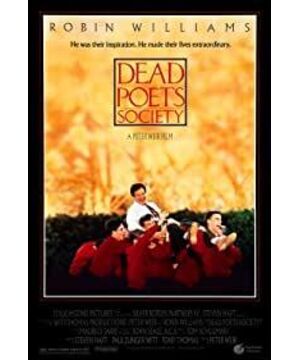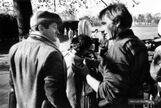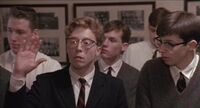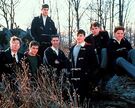Tradition, honor, discipline, excellence.
The four beliefs of Wilton Preparatory College are also the best portrayal of this famous school. A school like this is rightly so, a gathering place after the celebrities, and the students who are trained to be future Ivy League members. It heralds hope and glory, but also stereotypes and obsolescence.
Until such a teacher appeared: Mr Keating.
This always smiling man brought a spring breeze to the school.
With a relaxed face and whistling, he asked the students to call him Oh! Captain! My Captain! In the first class, he let the students look at the faces of the dead, and then whispered in their ears: Carpe Diem; He asked the students to tear up the preface of the poem, as if tearing out the old ideas; he taught them to write poetry not to write poetry, but to sing about the beauty of life; he stood on the podium and taught the students to use Seeing things differently;
under his guidance, they saw a whole new world.
They revived the Dead Poets Society, and in the middle of the night, they secretly met in the cave and took turns reading poems; they sat around the classroom and laughed while listening to Mr Keating's recitation; they played football at sunset; Neil did not Again a top student who obeyed his father's orders, he got a chance to perform; Todd was no longer a backwater retreating behind the crowd, he read his brilliant poem in front of the class; Knox was no longer far away Looking at Chris from a distance, he took the initiative to express his goodwill;
they are no longer stereotyped top students, the hope of the future, but the fresh life, the real self.
This is a movie that made me look at it and cry at the end.
Neil's death is a tragedy. This top student bears the heavy expectations of his parents for him to be admitted to Harvard and become a doctor, but what he most wants to do in his heart is to perform dramas. Live on principle or live on impulse, he finally chose the latter under the influence of Mr Keating's Carpe Diem. In fact, he put on a good show, making the audience below laugh, but his father kept his face tense.
The cruelty of reality is a bridge, but it is a prison leading to more tragedies.
Savouring the splendor that came to an abrupt end, and the misfortune that followed, I have to say, it was all a tragedy.
Neil's father's attitude towards his son was a tragedy:
despite watching his wonderful performance, he was unmoved, still shattered his dream and brought him back to reality: a superiority but not him desired way forward. Does he love his son? Perhaps there are no parents in the world who do not love their children, but is that true love? Chopping up beliefs and dreams is like taking a person's life. After Neil chose to shoot himself, I saw no trace of him reflecting on his attitude.
Neil's inability to fight was a tragedy:
I thought Neil was a brave man. At least he can bravely revive the Dead Poets Society, he can bravely take to the stage, but the real feelings that he didn't tell his father in the end proves that he is a good actor. In the end, he failed to be truly brave, but chose to bow his head to reality. Perhaps, only death can free him from the anguish that his ideal cannot be realized.
Cameron's betrayal was a tragedy:
it wasn't a character I liked, though at first. However, in the end, seeing him so easily, he shifted all the responsibilities to Mr Keating to protect his future, and the disgust in his heart arose spontaneously. Watching the members of the Dead Poets Society finally sign the instructions, my heart is no longer disgusted, it can only be said to be a little chilling. Such students, with the exception of Charlie, had to bow their heads before the enormous power. They may have been self-seeking, and have had fun, but in the end they are still weak. This is why many reformers do not end well, and those who are wise and safe often live happily.
Wilton's existence is a tragedy:
while watching the film, I wondered, what kind of talents can such an elite school produce? The future doctors, lawyers, bankers, and future heroes of heaven, all of them are as rigid as ancient clocks, as if they were carved from the same mold. Is this good? Nature is good, and the society needs such people, who are excellent and outstanding, obedient and obedient. This is called harmony. Such people will always be the majority of society, while innovators like Mr Keating will always be a minority. The minority rebels against the mass, and the mass suppresses the minority. So this ending I vaguely guessed from the beginning: In such a rigid world, teachers like Mr Keating can only be kicked out.
Although the development of the last part is like an interlocking line, I have to say that the ending still shocked me too much.
Todd, who had always been cowardly and weak, finally shouted the truth in front of Noren, in front of the whole class. Looking at the lonely back of Mr Keating slowly leaving the classroom, Todd stood on the desk and said Captain aloud! My Captain! Afterwards, students one after another stood on the desks and looked at Mr Keating who was about to leave.
I go backwards and over and over and over and over and look back at this ending, but over and over again, my heart will be shaken and my eyes will be filled with tears.
So, at this moment, at this moment, let me also stand on my chair and say:
Oh! Captain! My Captain!
Carpe Diem! Seize the day!
View more about Dead Poets Society reviews






